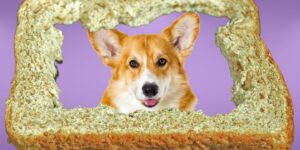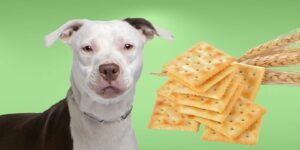The short answer is: yes, dogs can eat muffins in moderation. However, there are some things to consider before feeding your dog a muffin as not all muffin ingredients are safe for your canine companion. This article will provide important information on the potential risks of feeding dogs muffins, safe muffin ingredients for dogs, and how to create dog-friendly muffin alternatives.
Potential Risks of Feeding Dogs Muffins
Muffins often contain ingredients that can be harmful to dogs. Some of these ingredients include:
Chocolate toxicity
Chocolate is toxic to dogs and can cause vomiting, diarrhea, rapid breathing, increased heart rate, seizures, and even death. Even small amounts of chocolate in a muffin can be dangerous for your dog.
Xylitol poisoning
Xylitol, a common sugar substitute, is extremely toxic to dogs. Signs of xylitol poisoning include vomiting, seizures, and even death. Muffins containing xylitol should never be given to dogs.
Nuts and their potential dangers
Certain nuts, like macadamia nuts, are toxic to dogs and can cause weakness, vomiting, tremors, and hyperthermia. It's best to avoid giving muffins containing nuts to your dog.
Grapes and raisins as toxic ingredients
Grapes and raisins are toxic to dogs and can cause kidney failure. If a muffin contains grapes or raisins, do not give it to your dog.
Artificial sweeteners and additives
Some artificial sweeteners and additives used in muffins can cause gastrointestinal upset and other health problems in dogs.
Muffin Ingredients That Are Safe for Dogs
If you want to share a muffin with your dog, consider using these dog-safe ingredients:
Whole grains and their benefits
Whole grains like rolled oats and brown rice flour are healthier options for dogs, as they provide essential nutrients and fiber.
Fruits and vegetables that can be incorporated
Fruits like bananas and apples (without seeds) and vegetables like carrots and pumpkin can be added to dog-friendly muffins for additional vitamins and minerals.
Dog-friendly protein sources
Eggs and lean meats like turkey or chicken can be included in dog-safe muffins for added protein.
Safe sweeteners for dogs
While not necessary, natural sweeteners like honey or maple syrup can be used to sweeten dog-friendly muffins in small amounts.
Creating Dog-Safe Muffin Alternatives
Recipe for dog-friendly muffins
To make a batch of dog-safe muffins, combine 1 cup of rolled oats, 1 cup of brown rice flour, 1 mashed banana, 1 grated apple, 1 cup of pumpkin puree, 1/4 cup of honey, 2 eggs, and 1/2 cup of unsweetened apple sauce. Pour the batter into a greased muffin tin and bake at 350°F for 25-30 minutes.
Tips for customizing dog-friendly muffins with safe ingredients
Feel free to get creative with your dog-friendly muffin recipe by adding dog-safe ingredients like blueberries, shredded zucchini, or cooked, diced lean meats.
Baking and storage tips
Store your dog-friendly muffins in an airtight container in the refrigerator for up to a week, or freeze them for up to 3 months.
Signs of Allergic Reactions or Intolerance in Dogs
If your dog has an allergic reaction or intolerance to an ingredient in a muffin, they may exhibit symptoms such as:
Gastrointestinal symptoms
Vomiting, diarrhea, and abdominal pain can indicate an allergic reaction or intolerance.
Skin irritations and itching
Excessive scratching, inflamed skin, and hot spots may be signs of an allergic reaction.
Breathing difficulties
Coughing, wheezing, and shortness of breath can signal an allergic reaction in dogs.
Lethargy and other behavioral changes
If your dog becomes lethargic or shows signs of discomfort after eating a muffin, they may have an allergy or intolerance to an ingredient.
What to Do If Your Dog Eats a Potentially Harmful Muffin
Immediate steps to take
If your dog eats a muffin containing harmful ingredients, try to remain calm and remove any remaining pieces of the muffin from your dog's reach.
When to contact a veterinarian
If your dog exhibits any symptoms of poisoning or an allergic reaction, contact your veterinarian or an emergency animal hospital immediately.
Possible treatments and outcomes
Depending on the severity of the situation, treatments may include inducing vomiting, administering activated charcoal, or providing supportive care.
Responsible Treat Feeding
The importance of moderation
Muffins should be fed to dogs in moderation as an occasional treat, not as a meal replacement or daily snack.
Alternating between different types of treats
Switch up the treats you give your dog to provide a variety of flavors and nutrients while avoiding overexposure to any one ingredient.
Monitoring your dog's weight and overall health
Keep an eye on your dog's weight and overall health to ensure they are consuming a balanced diet and not receiving too many treats.
Final Thoughts
Balancing the desire to share treats with your dog and their safety is crucial. By choosing dog-safe ingredients and creating homemade dog treats, you can provide your dog with a healthy and delicious alternative to store-bought muffins. Responsible pet ownership includes ensuring that your dog's treats are both enjoyable and safe for them to consume.











